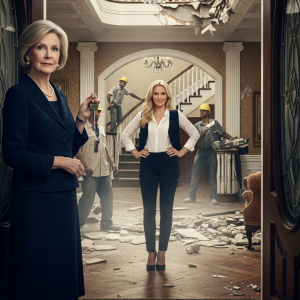Clara Vance existed in a world of precise calculations. As a lead structural engineer for one of Chicago’s top firms, her life revolved around stress loads, tensile strengths, and the unwavering laws of physics. It was a world that rewarded logic and punished carelessness, which was why the numbers in her parents’ retirement account had been a source of quiet, gnawing anxiety for the past two years.
She was working late, as she often did, a half-eaten container of Pad Thai next to her keyboard, finalizing the seismic retrofitting for a downtown skyscraper. During a brief pause, she allowed herself a moment of distraction, scrolling through her phone. Her younger sister Sophie’s Instagram feed was a sun-drenched fantasy of European cafes, designer handbags, and infinity pools. The latest post was from a balcony in Santorini, Sophie raising a glass of champagne to the camera. The caption was typically vague: “Living the life I deserve! #blessed #goodvibes”
Clara frowned. She knew for a fact that Sophie’s part-time job at a trendy boutique couldn’t possibly fund such a lifestyle. A familiar knot of unease tightened in her stomach. She opened another tab on her computer, the one she checked more often than she wanted to admit: the joint investment account she had established for her parents’ retirement. She was the primary contributor, funneling a significant portion of her substantial salary into it for nearly a decade.
The balance was down. Again. Far more than any market fluctuation could explain.
She called her parents the next morning. Her father, Mark, answered, his voice a little too breezy. “Oh, the market, Clara, you know how it is. It’s a rollercoaster! It took a real dip last quarter. Don’t you worry your brilliant head about it.”
Her mother, Linda, chimed in from another extension, her tone a practiced melody of reassurance. “And your father’s dental implants were just shockingly expensive! A whole series of them. These things just pop up when you get to our age, dear. It’s all perfectly normal.”
It wasn’t normal. The excuses were becoming increasingly flimsy, paper-thin explanations for a six-figure discrepancy. They spoke of “surprise tax bills” and “a failed startup investment with a friend,” each story more elaborate and less believable than the last. When Clara had gently suggested that Sophie’s extravagant travels seemed at odds with her income, her mother had been quick to defend her favorite. “Oh, you know Sophie! Her new boyfriend is just incredibly generous. From a very wealthy family.”
Clara’s only solace during this time had been her weekly calls with her grandmother, Eleanor. In her late eighties, Eleanor’s body may have been frail, but her mind was as sharp and clear as a diamond. She never pried, but she asked questions that had a way of cutting through the noise.
“Tell me about your new project, dear,” Eleanor would say, and she would listen intently as Clara explained the complex physics of bridge construction. “You have a good head on your shoulders, Clara. A logical mind. Don’t ever let anyone treat your hard work like it’s their personal piggy bank.” Another time, she had said, almost as an aside, “Remember, dear, true responsibility means holding others accountable, too. It’s the harder, and often lonelier, part of love.”
The last time Clara had seen her grandmother in person, a few months before she passed, had been unsettling. Clara was heading to a lunch meeting when she saw Eleanor exiting a discreet office building downtown. The polished brass plaque beside the door read: Dalton & Finch: Forensic Accounting and Private Fiduciary Services.
Clara had caught up to her, surprised. “Grandma? What are you doing here?”
Eleanor had smiled, her eyes twinkling, but her cheerfulness seemed a little forced. “Oh, just getting some old papers notarized, dear. The bureaucracy of getting old is a full-time job in itself! Now, tell me, have you eaten?” She had deftly changed the subject, but the image of the firm’s name stayed with Clara, a puzzle piece she couldn’t quite place.
The air in the lawyer’s conference room was heavy and still, smelling of old leather, lemon polish, and restrained grief. Clara sat on one side of the vast mahogany table, a solitary figure in a simple black dress. Her sorrow was a quiet, genuine ache. Her grandmother had been her anchor, her confidante.
On the other side of the table sat her parents and Sophie. Their grief was a louder, more performative affair. Her mother clutched a lace handkerchief, dabbing at perfectly dry eyes. Sophie, dressed in a stylishly somber designer outfit, sighed dramatically at regular intervals. Beneath their show of mourning, however, was a palpable thrum of anticipation. They leaned forward slightly in their chairs, a predatory eagerness in their posture. They were certain that Sophie, the coddled, adored youngest grandchild, was about to become a very wealthy woman.
The lawyer, Mr. Davies, a man whose face seemed carved from granite, cleared his throat. He began to read the will’s preamble in a dry, dispassionate monotone. Sophie’s foot began to tap an impatient rhythm against the floor.
“First,” Mr. Davies said, looking over his spectacles at the family, “I must inform you that the entirety of the estate of Eleanor Vance—including the property in Naples, Florida, her residence in Chicago, and her considerable stock and bond portfolio—will not be disbursed directly to any individual.”
Sophie’s foot stopped tapping. Her parents exchanged confused, irritated glances. This wasn’t a simple inheritance; it was a structure, a system. And that meant rules.
Mr. Davies continued, his voice unchanging. “Instead, all assets, liquid and fixed, are to be consolidated into a newly formed legal entity: The Eleanor Vance Family Trust.”
He paused, taking a sip of water, allowing the weight of his next words to gather. He picked up a separate sheet of paper, enclosed in a sealed envelope. “Before outlining the trust’s operational structure, Mrs. Vance included a personal addendum, which she instructed me to read verbatim.”
He put on his reading glasses, his gaze fixed on the page. His voice became the vessel for Eleanor’s, a clear, resolute message from beyond the grave.
“I have established this trust,” he read, “because I was forced to confront a sad and disillusioning truth in my final months. A truth discovered not through hearsay, but through a meticulous review of financial records. The truth that the diligence, hard work, and filial piety of one of my grandchildren were being systematically plundered to finance the idleness, irresponsibility, and selfishness of other members of my family.”
The blood drained from Linda’s face. Mark seemed to shrink in his chair. Sophie’s expression of bored anticipation curdled into one of shocked disbelief. The accusation was precise, public, and undeniable.
Mr. Davies did not look up. He continued to read from Eleanor’s final, devastating statement.
“A family is a system of mutual support, not a one-way pipeline of unearned entitlement. Therefore, I have designed this trust not as a gift, but as a corrective measure. A tool to enforce the responsibility that has been so profoundly lacking.”
He placed the sheet down and returned to the main document, his voice reverting to its dry, legal tone. He was about to deliver the final, crushing blow.
“For this reason, and for the reasons outlined in the private report submitted by Dalton & Finch, which is now part of this will’s official record, I hereby appoint the sole trustee of The Eleanor Vance Family Trust, with absolute and final authority to approve or deny any and all disbursements…” He paused, looking directly at Clara for the first time. “…my granddaughter, Clara Vance.”
A strangled gasp escaped Sophie’s lips. Clara stared at the lawyer, her mind reeling, unable to process what she was hearing.
Mr. Davies continued, his voice a relentless hammer of consequences. He began to outline the humiliating conditions, the rules of their new reality.
“One: Sophie Vance will be eligible for a monthly stipend, equivalent to the local minimum wage for a forty-hour work week, only upon providing the trustee with legally verifiable proof of full-time employment.”
“Two: Mark and Linda Vance will be eligible for their monthly living expense allowance only after completing and providing certification from an accredited financial counseling course, to be approved by the trustee.”
“Three: All non-essential funding requests—for travel, investments, personal projects, or declared emergencies—must be submitted in a formal written proposal to the trustee, Ms. Clara Vance, whose decision is final, binding, and not subject to appeal.”
The room was utterly silent, save for the sound of Sophie’s ragged breathing. The trap, so carefully and secretly set by the family matriarch, had been sprung
The silence in the conference room shattered. Sophie shot to her feet, her face a mask of furious indignation.
“This is insane!” she shrieked, pointing a trembling finger at Clara. “This is your doing! You manipulated a sick, old woman! You poisoned her against us!”
Her father, looking pale and utterly defeated, tried to intervene. “Now, Sophie, let’s just calm down…”
Mr. Davies held up a hand, his expression cold and impassive. “I would advise you against making such baseless accusations, Miss Vance. Your grandmother underwent a full psychiatric evaluation, conducted by a court-appointed physician, one week before signing this document. She was found to be of exceptionally sound mind. The will is ironclad.”
The family’s world had been turned upside down in the space of ten minutes. Clara, the overlooked, responsible daughter, was now the matriarch. Sophie, the coddled princess, and her enabling parents were now, in essence, dependents, their financial lives subject to the absolute authority of the very person they had been stealing from for years.
The first test of this new order came a week later. Clara was at her office, trying to focus on a blueprint, when her phone rang. It was Sophie. Her tone was no longer arrogant, but clipped and sullen. “The rent is due. And my car payment. I need you to transfer the money.” It was a demand, not a request.
Clara felt a wave of exhaustion. This was her new, unwanted reality. She took a deep breath, channeling her grandmother’s quiet strength. “I can’t do that, Sophie. You know the terms.”
“What am I supposed to do? Get evicted?” Sophie snapped.
“The terms are clear,” Clara repeated, her voice steady. “Send me a copy of your resume and a list of the full-time jobs you’ve applied for this week. Once I see that, we can discuss a small, one-time advance against your future stipend after you’re employed. I’ll also approve a payment for one session with a career counselor.”
The line was silent for a moment, then filled with a scream of pure, impotent rage before Sophie slammed the phone down.
The call from her parents was more pathetic. Her father mumbled something about needing money for property taxes. Clara calmly explained that she would approve a direct payment to the county treasurer’s office, but that she would first need to see the enrollment confirmation for their financial counseling course. The conversation ended with her father’s weary sigh of resignation.
The power dynamic had not just shifted; it had been violently inverted. They were no longer the ones in control, doling out fake smiles and flimsy lies. They were supplicants, forced to prove they were responsible enough to receive funds that were, in a bitter twist of irony, generated by an estate they had taken for granted and a sister they had systematically betrayed.
The destruction was not a single, fiery explosion, but a slow, grinding demolition of pride. Financially, Sophie and her parents were cut off. The endless river of money that had funded Sophie’s fake Instagram life and her parents’ comfortable complacency had dried up overnight.
Sophie was forced to give up her apartment, sell her designer clothes on consignment, and move back into her parents’ house. Her “wealthy” boyfriend, upon discovering she was not the heiress she had pretended to be, vanished without a trace. Her world of #blessed had become a world of #broke.
Psychologically, the ruin was even more profound. Their arrogance was crushed under the weight of their new reality. Every time they needed money for groceries, for a utility bill, for a car repair, they had to go through Clara. They had to draft a written request, provide documentation, and await the judgment of the daughter they had treated as little more than an ATM. Each request was a fresh humiliation, a stark admission of their failure and dependency.
For Clara, however, there was no sweet taste of revenge. The victory felt hollow, the power a heavy, unwelcome burden. One evening, sitting alone in her quiet apartment, she looked at a framed photo of her and Eleanor, taken years ago. Her grandmother was smiling, her eyes full of a knowing wisdom.
In that moment, Clara understood. Eleanor hadn’t given her a reward; she had given her a job. A painful, thankless, and necessary job. The responsibility of forcing the people she was supposed to love to finally confront the consequences of their actions, to learn the lessons of accountability they had spent their entire lives avoiding.
She picked up her phone and opened her email. There was a new request from her parents. It was a formal application, as stipulated by the trust, for funds to cover the tuition for their financial counseling course. Attached was a signed enrollment confirmation.
With a deep sigh, she typed her reply. Approved. It wasn’t an act of forgiveness, and it wasn’t an act of revenge. It was the first, weary step in a long, arduous journey. It was the first act of her new, unwanted, and inescapable reign.




